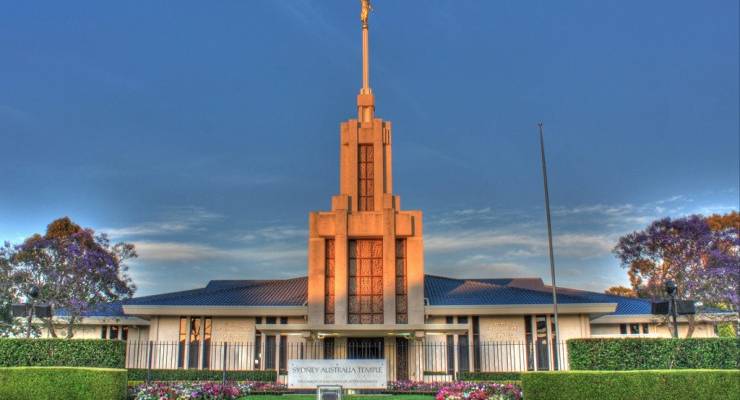
The federal government’s special exemptions for religious charities are again under question following weekend revelations on the alleged international money-shifting practices of the giant, Utah-based Mormon Church.
The Mormon Church — or the Church of Jesus Christ of Latter Day Saints, as it is formally known — is registered as a Basic Religious Charity (BRC) on the Australian charities’ register. As such it is entitled to a series of special exemptions on public accountability which allow the charity to operate in near total secrecy, beyond the reach of the regulator.
As Crikey detailed earlier this month, BRCs do not need to supply financial detail on their operations to the government or the public despite benefiting from tax exemptions. The Australian Charities and Not-for-profits Commission cannot suspend or remove a member of a BRC’s governing body, which it can for other charities. Nor does a BRC need to meet any of the governance standards which apply to other charities.
As Nine newspapers and 60 Minutes reported last week, the Mormon Church is accused of overstating the amount it gives in charity by more than $1.5 billion, while it is also reportedly under scrutiny over an alleged international tax minimisation scheme that involves Australia-based church entities.
The Nine outlets further reported that the church had built an “extraordinary pile of tax-free wealth” through the giving of tithes from its members. In addition, the church was reported to run a US$100 billion tax-free investment fund, Ensign Peak Advisors, with “multibillion-dollar investments” in Apple, Microsoft, Amazon and Google owner Alphabet, as well as major weapons manufacturers Lockheed Martin, Boeing and Northrop Grumman.
Church whistleblower Ryan McKnight has alleged the church was not so much a religion that dabbles in business but a business that dabbles in religion, an allegation the church denies. The church said through a spokesman: “The Church of Jesus Christ is not a financial or profit-making institution and uses its resources to carry out its divinely appointed mission”.
As Crikey has reported, BRC exemptions entered law a decade ago when Labor was in government following intense lobbying led by the Catholic Church. The exemption was sold as being necessary for small, volunteer-run church charities which didn’t have the means or ability to meet the government’s accountability requirements.
But in the years since the legislation was passed, large church organisations running major income-generating businesses have managed to have themselves categorised as BRCs — a development that tax experts consider out-of-step with the intention of the legislation.
In 2018 former commissioner with the Royal Commission into Institutional Responses to Child Sexual Abuse Robert Fitzgerald called for a review of the BRC exemption. He said the royal commission had demonstrated a need for “greater transparency and accountability in relation to all non-profits, but particularly charitable organisations”.
In addition to its BRC-registered entity, the Mormon church runs the LDS Trust Fund, which is registered as a non-BRC charity in Australia. Its most recent accounts disclose a total income of $100 million, with outgoings to LDS-linked charitable operations including a church building fund.
The Canadian Broadcasting Corporation (CBC) reported late last week that former members of the Mormon Church had called for a tax investigation in Australia into allegations the church may have engaged in “widescale tax avoidance or tax evasion” by running its activities through “what appears to be a shell company that had no paid employees”.
Assistant Minister for Competition, Charities and Treasury Minister Andrew Leigh told the CBC he was unable to comment on whether or not there was an investigation. He said it was “important that everyone is playing by the rules” and that “charity shouldn’t be a way of sheltering yourself from appropriate tax payments”.
The Mormon Church said it had not violated any tax laws in Australia. “Donations [are] used for overseas aid projects that satisfy Australian charities and tax rules,” a spokesperson said.
Crikey has sought comment from Andrew Leigh on both the possible Mormon Church investigation and the appropriateness of the BRC exemption.








Exactly. And it’s not just the Mormons, there are so many other organisations and individuals that say much the same about not breaking any laws, not just in relation to tax but also in relation to resource royalties, political donations, allocation of government grants, sinecures handed to mates by ministers; and so on. The biggest scandal of all is that they are telling the truth. The crimes of the century, except it’s all legal.
Yet another example of Law being the Crime.
One of the first lessons in jurisprudence is that Justice is not the aim of the legal system but anathema.
Like religion, it is intended to preserve privilege and stop the poor eating the rich.
As Anatole France remarked, more or less,
Just another, well if its not illegal, who cares?
Immoral behaviour not justified by claiming exemptions to the laws surrounding charitable causes.
Same template as all the Evangelical churches. Religion has been a great business for years.
When religion & rulers realise their mutual interests, people are just livestock.
Rulers learned a long time ago of the usefulness of religion for grooming a population to the point where the rulers can exploit it as much as they like and the population will just go along with it. Organised religion therefore provides an excellent service for corrupt governments whose members are working for themselves and the countrys elite. So dont expect too much enthusiasm for change from our pollies, they like things the way they are.
Stop going to church, cancel your direct debit to the local god botherer and kick up about their tax free status. Amen.
Blessed are the freeloaders, for they shall be secret.